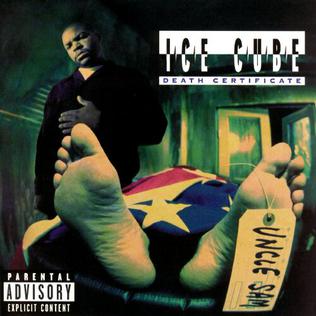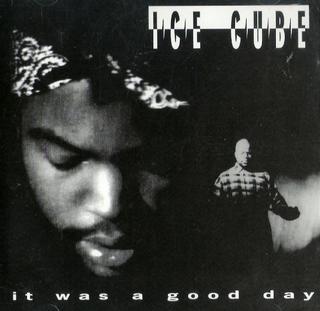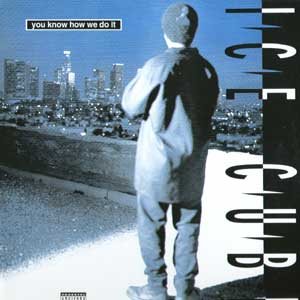Gangsta rap or gangster rap, initially called reality rap, is a subgenre of hip-hop that conveys the culture and values typical of urban gangs and street hustlers. Emerging in the late 1980s, gangsta rap's pioneers include Schoolly D of Philadelphia and Ice-T of Los Angeles, later expanding in California with artists such as N.W.A and Tupac Shakur. In 1992, via record producer and rapper Dr. Dre, rapper Snoop Dogg, and their G-funk sound, gangster rap broadened to mainstream popularity.

Tracy Lauren Marrow, better known by his stage name Ice-T, is an American rapper and actor. He is active in both hip hop and heavy metal. Ice-T began his career as an underground rapper in the 1980s and was signed to Sire Records in 1987, when he released his debut album Rhyme Pays. The following year, he founded the record label Rhyme $yndicate Records and released another album, Power (1988), which would go platinum. He also released several other albums that went gold, including The Iceberg/Freedom of Speech... Just Watch What You Say! (1989), O.G. Original Gangster (1991) and Home Invasion (1993).
N.W.A was an American hip hop group formed in Compton, California. They were among the earliest and most significant popularizers and controversial figures of the gangsta rap subgenre, and the group is widely considered one of the greatest and most influential groups in the history of hip hop music.

O'Shea Jackson Sr., better known as Ice Cube, is an American rapper, songwriter, actor, and film producer. His lyrics on N.W.A's 1988 album Straight Outta Compton contributed to gangsta rap's widespread popularity, and his political rap solo albums AmeriKKKa's Most Wanted (1990), Death Certificate (1991), and The Predator (1992) were all critically and commercially successful. He was inducted into the Rock and Roll Hall of Fame as a member of N.W.A in 2016.

Robert Matthew Van Winkle, known professionally as Vanilla Ice, is an American rapper, actor, and television host. Born in South Dallas, and raised in Texas and South Florida, Ice released his debut album, Hooked, in 1989 on Ichiban Records, before signing a contract with SBK Records, a record label of the EMI Group, which released a reformatted version of the album in 1990 under the title To the Extreme; which became the fastest-selling hip hop album of all time and contained Ice's best-known hits: "Ice Ice Baby" and a cover of "Play That Funky Music". "Ice Ice Baby" was the first hip hop single to top the Billboard charts and has been credited with helping to diversify hip hop by introducing it to a mainstream audience.

Yolanda Whitaker, also known as Yo-Yo is an American rapper and actress.

Erik Francis Schrody, known by his stage names Everlast and Whitey Ford, is an American rapper, singer, and songwriter who was the frontman for hip hop group House of Pain. His breakthrough as a solo artist came in 1998 with his album Whitey Ford Sings the Blues, which blended rock and hip-hop and garnered him his first Grammy Award nomination for the song, "What It's Like". The album peaked at number 9 on the Billboard 200 album chart, while the single peaked at number 13 on the Billboard Hot 100 singles chart. As of 2023, they remain his highest mainstream chart positions for an album and single respectively.

Rap rock is a music genre that developed from the early to mid-1980s, when hip hop DJs incorporated rock records into their routines and rappers began incorporating original and sampled rock instrumentation into hip hop music. Rap rock is considered to be rock music in which lyrics are rapped, rather than sung. The genre achieved its greatest success in the late 1990s and early 2000s.

Hip hop or hip-hop is a culture and art movement that was created by African Americans pioneered from Black American street culture, also known as hip hop African American culture, that had been around for years prior to its more mainstream discovery while later reaching other groups such as Latino Americans and Caribbean Americans, starting in the Bronx, New York City. Hip Hop is one of cultural movements that has been shaped and dominated by African American males though female hip hop artists have contributed to the art form and culture as well. Hip hop culture is characterized by the key elements of rapping, DJing and turntablism, and breakdancing. Other elements include historical knowledge of the movement, graffiti, beatboxing, street entrepreneurship, hip hop language, and hip hop fashion.

Death Certificate is the second studio album by American rapper Ice Cube. It was released on October 29, 1991, through Lench Mob Records and Priority Records. The production on the album was primarily handled by Sir Jinx, DJ Pooh and Ice Cube. The album was supported by two singles: "Steady Mobbin'" and "True to the Game".

"It Was a Good Day" is a song by American rapper Ice Cube, released on February 21, 1993 as the second single from his third solo album, The Predator (1992). The song peaked at No. 7 on the Billboard Hot R&B/Hip-Hop Songs chart and No. 27 on the UK Charts. On the Billboard Hot 100, the song peaked at No. 15, making it Ice Cube's highest-charting single on the chart to date. The song's lyrics describe a generic pleasant day from his life; according to Ice Cube, he had no specific date in mind, though several attempts have been made to identify one.

"You Know How We Do It" is a song by American rapper, actor and filmmaker Ice Cube, released as the second single from his fourth studio album, Lethal Injection (1993). The song was released on February 2, 1994 by Lench Mob and Priority, and was a No. 30 hit on the US Billboard Hot 100. Musically, it is in the G-funk genre, and has the same kind of mood and feeling as "It Was a Good Day". The song samples "The Show Is Over" by Evelyn "Champagne" King, "Summer Madness" by Kool & the Gang, and "Billie Jean" by Michael Jackson.

Political hip hop is a subgenre of hip hop music that was developed in the 1980s as a way of turning hip hop into a form of political activism. Political hip hop generally uses the medium of hip hop music to comment on sociopolitical issues and send political messages to inspire action, create social change, or to convince the listener of a particular worldview. It was inspired partially by politically-focused 1970s artists such as The Last Poets and Gil Scott-Heron, as well as the Black Power movement and revolutionary politics of the 1960s and 1970s. Various hip hop artists emerged in the late 1980s espousing political messages and providing social and political commentary with KRS-One and his group Boogie Down Productions and Public Enemy in particular establishing themselves as some of the first predominantly political hip hop groups with albums in 1988. Soon to follow in 1989 and following years were other Political rappers, or known as "Conscious rap" including such groups as X-Clan, Poor Righteous Teachers, Paris (rapper), Disposable Heroes of Hiphoprisy and others The genre has helped to create a new form of social expression for subordinate groups to speak about their exclusions, injustices, and lack of power.
Hip-hop or hip hop, also known as rap, and formerly known as disco rap, is a genre of popular music that originated in the early 1970s by African Americans and Caribbean immigrants in the Bronx, a borough of New York City. Hip-hop music originated as an anti-drug and anti-violence genre consisting of stylized rhythmic music that often accompanies rapping, a rhythmic delivery of poetic speech. According to the professor Asante of African American studies at Temple University, "hip hop is something that blacks can unequivocally claim as their own". The music developed as part of the broader hip hop culture, a subculture defined by four key stylistic elements: MCing/rapping, DJing/scratching with turntables, breakdancing, and graffiti art. While often used to refer solely to rapping and rap music, "hip hop" more properly denotes the practice of the entire subculture. The term hip hop music is sometimes used synonymously with the term rap music, though rapping is not a required component of hip hop music; the genre may also incorporate other elements of the culture, including DJing, turntablism, scratching, beatboxing, and instrumental tracks.
LGBT representations in hip hop music have existed since the birth of the genre even while enduring blatant discrimination. Due to its adjacency to disco, the earliest days of hip hop had a close relation to LGBT subcultures, and multiple LGBT DJs have played a role in popularizing hip hop. Despite this early involvement, hip hop has long been portrayed as one of the least LGBT-friendly genres of music, with a significant body of the genre containing homophobic views and anti-gay lyrics, with mainstream artists such as Eminem and Tyler, the Creator having used homophobia in their lyrics. Attitudes towards homosexuality in hip hop culture have historically been negative, with slang that uses homosexuality as a punchline such as "sus", "no homo", and "pause" being heard in hip hop lyrics from some of the industry's biggest artists. Since the early 2000s there has been a flourishing community of LGBTQ+ hip hop artists, activists, and performers breaking barriers in the mainstream music industry.

Battle rap is a type of rapping performed between two or more performers that incorporates boasts, insults, wordplay and disses. Battle rap is often performed, or freestyled, spontaneously in live battles known as Rap battles, where participants will compete on the same stage to see who has the better verses.
Dale Anthony Resteghini, better known as Rage, is a music video and film director and record producer. Rage has helmed hundreds of videos for well-known acts from the global superstars to the emerging acts to the niche branded. A visually prolific and explosively versatile director, his work ranges from hardcore, heavy metal, rock, punk to hip hop and rap and gangsta rap. Rage is the founder of Raging Nation with Kim Resteghini, his wife and partner.
Comedy hip hop or comedy rap is a subgenre of hip hop music designed to be amusing or comedic, compared to artists who incorporate humor into their more serious, purist hip hop styles.
Progressive rap is a broad subgenre of hip hop music that aims to progress the genre thematically with socially transformative ideas and musically with stylistic experimentation. Developing through the works of innovative US hip hop acts during the 1980s and 1990s, it has also been known at various points as conscious, underground, and alternative hip hop.
Forbes magazine reported in 2017 that hip hop was the "dominant musical genre" in the U.S. music industry and, for the first time, outsold any other U.S. musical genre. With its cultural foundation in the South Bronx, hip hop has grown in popularity since its beginnings in 1979. Popular dominance of the genre coincided with the international #MeToo movement, which exposed the sexual misconduct of men in positions of power in the field of entertainment. Although women and men from all walks of life worldwide have shared their #MeToo stories, accounts in the music industry were few; the industry evaded public scrutiny, despite its dominance as broadcast and streaming media.











